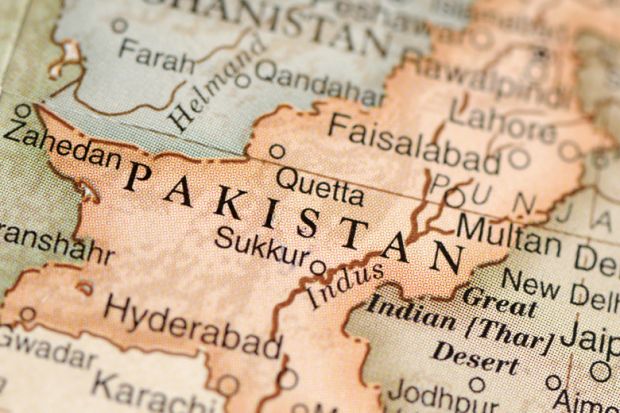Women’s universities in Pakistan are providing a positive and “progressive” space for female scholars and students, one of the authors of a major UK study of female academic careers has said.
The existence of women-only universities has divided Pakistan’s academy since the first such institution was established in 1998, with critics claiming they pander to religious extremists and help to entrench gender segregation in the Muslim-dominated state.
However, the single-sex institutions have grown significantly in number in recent years. Twenty-two of Pakistan’s 161 universities are open to female students only, although they have both female and male faculty.
Victoria Showunmi, lecturer in education at the UCL Institute of Education, said she was impressed by the positive environment she found at the institutions she visited during a three-year British Academy-funded project on the academic careers of female staff.
The study, carried out with University of Leicester education academics Saeeda Shah, the project's leader, and David Pedder, interviewed 40 female academics at both mixed-sex and women-only universities in Pakistan. In addition, almost 500 women responded to a questionnaire on challenges to career advancement.
In light of Dr Showunmi’s visits and the responses to the project, the UCL academic concluded that Pakistan’s single-sex institutions were overwhelmingly positive for both academics and students.
Describing her visit to Fatima Jinnah Women University in Rawalpindi, she said the institution “never came across as anything but a progressive space”.
“There were stories of some leaders holding some people back [for promotion], but it was the same type of story that we hear in the UK,” said Dr Showunmi, who presented the results of the project at the British Educational Research Association’s annual conference in Leeds last month.
“I am, of course, looking at it through my own lens as a black female UK academic, but it came across as a very good place for women academics to progress,” she added.
Dr Showunmi said the study, which involved annual visits to universities in Lahore, Rawalpindi and Islamabad between 2012 and 2015, as well as reciprocal visits to the UK by Pakistani academics, had shattered many of her preconceptions about female academics in Pakistan, who, she said, were very keen to travel abroad as well as gain advancement in their own country.
“Many of them aspired to do or had done two or three years in a different country, often sponsored by their government,” said Dr Showunmi, adding: “How many female academics in the UK go abroad for their PhD?”
Many of the barriers to academic promotion raised by women were also flagged by men, such as the lack of an embedded research culture and excessive teaching loads, the study found.
Women did face specific challenges, such as male-dominated leadership groups and family responsibilities, although these could also be cited by UK academics, Dr Showunmi said.
“It was refreshing to hear the conversations, as we could have been listening to academics in the UCL staff room,” she explained.
“There was a different religious context, but many were the same issues of work-life balance or difficulties in trying to access resources faced by [female] academics in the UK," she added.
Register to continue
Why register?
- Registration is free and only takes a moment
- Once registered, you can read 3 articles a month
- Sign up for our newsletter
Subscribe
Or subscribe for unlimited access to:
- Unlimited access to news, views, insights & reviews
- Digital editions
- Digital access to THE’s university and college rankings analysis
Already registered or a current subscriber? Login









